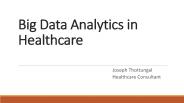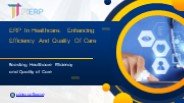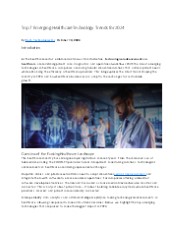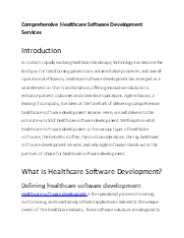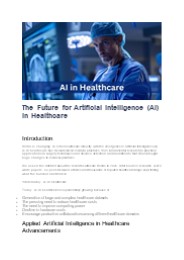Healthcare Claims Analytics PowerPoint PPT Presentations
All Time
Recommended
The ability to use insurance claim data analytics through machine learning can improve insurance and claims companies bottom line and overall profit. Modern customers require modern technologies to be able to see benefit and data analytics is the answer to fulfill the evolving demands of customers and the needs of the insurance and claims companies.
| PowerPoint PPT presentation | free to download
The ability to use insurance claim data analytics through machine learning can improve insurance and claims companies bottom line and overall profit. Modern customers require modern technologies to be able to see benefit and data analytics is the answer to fulfill the evolving demands of customers and the needs of the insurance and claims companies.
| PowerPoint PPT presentation | free to download
This Report provided by GrandResearchStore is about, global healthcare analytics market is expected to reach USD 24.55 billion by 2021 from USD 7.39 billion in 2016, at a CAGR of 27.1% from 2016 to 2021.
| PowerPoint PPT presentation | free to download
The global healthcare analytics market is segmented based on products, applications, components, delivery modes, end users, and geography. On the basis of product type, the market is divided into descriptive, predictive, and prescriptive analytics. The healthcare analytics market, by component, is divided into hardware, software, and services. Based on the mode of delivery, the market is classified into on-premise models, web-hosted models, and cloud-based models. Based on end users, the market is segmented into healthcare and others.
| PowerPoint PPT presentation | free to download
The global healthcare analytics market is segmented based on products, applications, components, delivery modes, end users, and geography. On the basis of product type, the market is divided into descriptive, predictive, and prescriptive analytics. The healthcare analytics market, by component, is divided into hardware, software, and services.
| PowerPoint PPT presentation | free to download
Healthcare Data Analytics market development
| PowerPoint PPT presentation | free to download
Healthcare IT market @ http://tinyurl.com/zxbxlzp . It is broadly segmented into healthcare providers and healthcare payers. The healthcare providers segment is further divided into hospitals; ambulatory care centers; home healthcare agencies, nursing homes, and assisted living facilities; diagnostic and imaging centers; and pharmacies. The healthcare payers segment is further divided into private payers and public payers. Hospitals form the largest end-user segment of the global healthcare IT market, owing to the huge demand for various HCIT solutions among hospitals in order to manage the increasing load of patient information generated in hospitals and growing need to improve the quality of healthcare while improving operational efficiencies within organizations.
TBRC global healthcare fraud analytics market report includes descriptive analytics, predictive analytics, prescriptive analytics, on-premise, on-demand, insurance claims review
| PowerPoint PPT presentation | free to download
TBRC global healthcare fraud analytics market report includes descriptive analytics, predictive analytics, prescriptive analytics, on-premise, on-demand, insurance claims review
| PowerPoint PPT presentation | free to download
Sunflower Lab - IOT, Big Data Analytics & AI Empowered Digital Healthcare Solutions
| PowerPoint PPT presentation | free to download
This presentation is intended to provide an introduction to Big data analytics in Healthcare; where it stands today and where it is heading to.
| PowerPoint PPT presentation | free to download
The global healthcare fraud analytics market size grew from $2.43 billion in 2022 to $3.09 billion in 2023 at a compound annual growth rate (CAGR) of 27.0%.
| PowerPoint PPT presentation | free to download
Bharat Book Bureau provides the report, on “Market Outlook on Global Healthcare Analytics ” The report overview on the Global Healthcare Analytics Market is segmented based on products, applications, end users, components and geography. Based on the product type, the market is further segmented into Descriptive, Predictive and Prescriptive analytics.
| PowerPoint PPT presentation | free to download
Asia Pacific Healthcare Analytics Market To Hit USD 7.1 Bn By 2028. Asia Pacific healthcare analytics industry share will showcase promising growth in the coming years due to its widespread applications in areas, such as patient management, disease prevention, and adherence to clinical protocols. Healthcare analytics consists of various qualitative and quantitative techniques to analyze different patterns and trends in the medical data records.
| PowerPoint PPT presentation | free to download
With Denial Management Services, you can chart a path to financial stability, allowing you to focus on what truly matters – providing top-notch patient care, while securing the financial future of your healthcare practice. Don’t let denials hold you back; embrace denial management services and unlock the success your practice deserves.
| PowerPoint PPT presentation | free to download
Analyze the Healthcare Fraud Analytics Market global market size with data from 2020, 2021 and projections of compound annual growth rates (CAGRs) through 2027.
| PowerPoint PPT presentation | free to download
Research Beam added a report “Global Healthcare Analytics Market Outlook 2015 – 2022”. The Global Healthcare Analytics Market accounted for $5.5 billion in 2014 and is expected to grow at a CAGR of 24.82% to reach $32.4 billion by 2022. Analytics help healthcare organizations in reduction of patients stays and readmissions in hospital, improved quality care, fraud identification and prevention of chronic diseases. To get details @ http://www.researchbeam.com/global-healthcare-analytics-outlook-2014-2022-market
| PowerPoint PPT presentation | free to download
Data in Business Analytics Perspective for Indian Healthcare Market By Debashis Basu Partner and Leader Enterprise Intelligence and Analytics EY India, Know More Here: http://transformhealth-it.org/
| PowerPoint PPT presentation | free to download
Analytics can convert these facts into actionable insights, process improvements and predictive approaches, which would dramatically influence the attainment of a health care system. For more details : http://bit.ly/1LklXS0
| PowerPoint PPT presentation | free to download
Healthcare analytics systems reveal and understand historical patterns of data to predict and provide actionable insights to improve the performance of healthcare organizations. The outcomes reveal the best-suited treatments, disease patterns, patients at high risk, fraudulent claims, and evaluate physician performance.
| PowerPoint PPT presentation | free to download
Healthcare industry has seen tremendous shifts with the way the adoption of technologies, innovation, and dynamic environments are shaping up. In this shift, healthcare stakeholders need to invest and examine real-time results or improvements proactively.
| PowerPoint PPT presentation | free to download
Due to significant growth in big data technologies such as tools for data orchestration, data mining and analyzing volumes of structured and unstructured data, adoption of big data in various industries has increased significantly. This has led to rapid increase in demand for big data analytics integration in healthcare services, on the back of which, the global big data analytics in healthcare market is gaining huge traction.
| PowerPoint PPT presentation | free to download
Explore the future of healthcare financial management with our groundbreaking approach to Revenue Cycle Management (RCM). Our innovative solutions leverage cutting-edge technology and data analytics to streamline and optimize every stage of the revenue cycle, from patient registration to claims processing and reimbursement.
| PowerPoint PPT presentation | free to download
A Healthcare Management System(HMS) is a software platform that facilitates the management of healthcare organizations by automating administrative, financial, and clinical tasks. It can help manage patient records, appointments, billing, insurance claims, and inventory management, among other things. This can result in improved patient care, increased efficiency, and cost savings
| PowerPoint PPT presentation | free to download
The report "North American Healthcare IT Market by Product (EHR, RIS, PACS, VNA, CPOE, mHealth, Telehealth, Healthcare analytics, Supply Chain Management, Revenue Cycle Management, CRM, Claims Management) by End User (Provider, Payer ) - Forecast to 2020",The North American healthcare IT market is estimated to reach USD 104.3 Billion by 2020, growing at a CAGR of 13.5% during the forecast period.
| PowerPoint PPT presentation | free to download
How AI is Transforming RCM: Key Trends for 2025 in Healthcare AI is revolutionizing Revenue Cycle Management! From predictive analytics for claim denials to automated coding and billing, AI ensures faster reimbursements, fewer errors, and improved cash flow. Stay ahead in 2025 by embracing these smart healthcare solutions! Need expert guidance? Contact Medical Billers and Coders at info@medicalbillersandcoders.com to optimize your RCM with AI-powered tools today! Read the given link for more information: https://bit.ly/403nf0a #AIinHealthcare #RevenueCycleManagement #MedicalBilling #RCMTrends #HealthcareInnovation #MBC #MedicalBillersAndCoders #RCMEfficiency #BillingAutomation
| PowerPoint PPT presentation | free to download
Struggling with unexpected medical bills due to denied claims? Learn how denial management in healthcare can mitigate financial headaches and optimize revenue.
| PowerPoint PPT presentation | free to download
Ensure compliance with regulatory standards using Salesforce tools for training, tracking, and reporting. These solutions help healthcare organizations maintain high standards, avoid penalties, and ensure patient safety in an evolving regulatory landscape.
| PowerPoint PPT presentation | free to download
The Healthcare Revenue Cycle Management Market involves managing the financial processes of healthcare providers, including billing, claims processing, and revenue generation. The market provides solutions and services that streamline administrative processes and improve revenue collection for healthcare organizations
| PowerPoint PPT presentation | free to download
Managing patient records, appointments, supplies, and finances is critical in healthcare. ERP systems streamline these tasks, enhancing operations and patient care. They ensure accessible data, efficient scheduling, inventory management, and regulatory compliance. By improving communication, ERPs reduce administrative burdens, making healthcare delivery more efficient and patient-friendly. Key features include management, analytics, and security, which collectively modernize healthcare operations and improve overall quality of care. For more details, visit: https://pierp.software/erp-in-healthcare-enhancing-efficiency-and-quality-of-care
| PowerPoint PPT presentation | free to download
In healthcare, maintaining patient records, scheduling appointments, ordering supplies, and managing finances are critical tasks. ERP systems streamline these functions, enhancing operational efficiency and patient care. They ensure seamless data access, optimize scheduling, manage inventory effectively, and ensure regulatory compliance. By improving communication between departments, ERPs minimize administrative burdens, making healthcare delivery more efficient and patient-centered. Key features such as management capabilities, analytics, and robust security further support these improvements.
| PowerPoint PPT presentation | free to download
For more information kindly visit : https://www.bharatbook.com/healthcare-market-research-reports-223896/healthcare-bpo-billing-payer-claims-management-pharmaceutical-outsourcing-approaches.html Bharat Book Bureau provides the report, on “Healthcare BPO Market by Provider, Payer, Pharmaceutical, Non-Clinical, Sales and Marketing, Outsourcing Approaches, & Models - Global Forecasts to 2021”. The healthcare BPO market is broadly segmented on the type of healthcare services outsourced into provider services, payer services, and pharmaceutical services.
| PowerPoint PPT presentation | free to download
Explore AI’s impact on healthcare as cutting-edge trends and pioneering use cases reshape patient care, diagnosis, and medical research.
| PowerPoint PPT presentation | free to download
To maintain financial stability, healthcare organizations must become proficient at turning denials into dollars by optimizing revenue recovery from denied claims.
| PowerPoint PPT presentation | free to download
Optimize your Durable Medical Equipment (DME) business with INF Healthcare's DME billing solutions, enhancing revenue cycle management through expert billing and compliance services.
| PowerPoint PPT presentation | free to download
Predictive analytics has proven to be instrumental in forecasting potential fraudulent activities within the healthcare domain. By analyzing historical data and identifying behavioral trends, predictive analytics algorithms can effectively assess the likelihood of fraudulent behavior, enabling preemptive measures to be implemented. This proactive approach has not only minimized the occurrence of fraudulent incidents but has also instilled a sense of confidence among stakeholders, reinforcing the integrity of the healthcare system. Know More- https://www.alliedmarketresearch.com/medical-fraud-detection-management-market
| PowerPoint PPT presentation | free to download
Client Analytics & Consulting Rocky Henisey Director, Client Analytics & Consulting BCBS Texas (HCSC) Darren Taylor President, Cobalt Talon (Subsidiary of BCBS ...
| PowerPoint PPT presentation | free to view
As the healthcare industry continues to evolve, CertifyHealth remains committed to driving innovation and excellence in patient care. By adopting these advanced technologies, healthcare providers can ensure they are well-equipped to meet the challenges of today and tomorrow, ultimately delivering superior care to their patients.
| PowerPoint PPT presentation | free to download
Durable Medical Equipment (DME) billing is one of the most complex and time-consuming aspects of healthcare revenue cycle management. From navigating regulatory compliance to managing high denial rates and complex authorization processes, these challenges can significantly impact cash flow and efficiency.
| PowerPoint PPT presentation | free to download
The healthcare sector embraces continuous transformation, technological advancements in healthcare are redefining patient care, diagnostics, and operational workflows. With the rise of emerging technologies in healthcare, companies are racing to build innovative solutions that address patient needs while enhancing the efficiency of healthcare providers.
| PowerPoint PPT presentation | free to download
Here are the Comprehensive Healthcare Software Development Services for your healthcare organization. This blog elaborates on everything you need to know about!
| PowerPoint PPT presentation | free to download
Cloudpital gathers the information from numerous source frameworks and perform ETL and solidify the information to make it valuable for detailing purposes.
| PowerPoint PPT presentation | free to download
Optimizing Healthcare Delivery: The Power of BPO Services
| PowerPoint PPT presentation | free to download
The predictive analytics technology is being utilized by several businesses as a useful tool for reducing risks associated with fraudulent claims and for surging marketing efficiency.
| PowerPoint PPT presentation | free to download
Mediclaim, the traditional health insurance product accounting for more than 80% of total health insurance market in India, is short-term in nature and covers only ...
| PowerPoint PPT presentation | free to view
You’ve got appeal letters up to your eyeballs, staff wasting time on admin headaches, and missed revenue leaking out. Visit-https://www.bridgestonehrs.com/denial-management-software-for-healthcare-practices/
| PowerPoint PPT presentation | free to download
The healthcare industry has traditionally been one of the slowest fields to adopt new technologies. This has to do with the fears around security and the privacy of patient data. Healthcare companies have always preferred to keep data behind a secure firewall or even onsite as opposed to maintaining it on something as intangible as the cloud. Kairos tells you how the disruption happened in Healthcare.
| PowerPoint PPT presentation | free to download
The growing demand of healthcare industries and the adoption of digital technologies have doubled up the market of digital healthcare and in next three years by 2020 it will excel up to $200 billion. The growing popularity of mobile healthcare and its applications had contributed the global healthcare market beside, the wireless technology, sensors, and wearable devices. The digital health innovation including the integration of healthcare with cloud-based systems and the invention of software like predictive analytics, care management, practice management has impacted the growth of pharma and healthcare companies. The demand of mhealth or mobile healthcare will witness the revolutionary growth of 35% which will rise to two hundred billion USD by 2024.
| PowerPoint PPT presentation | free to download
Healthcare BPO market reports, Market Size, Share, Market Intelligence, Company Profiles, Market Trends, Strategy, Analysis, Forecast 2017-2022 HEALTHCARE BPO MARKET INSIGHTS: The global healthcare BPO market reports is anticipated to grow with the CAGR of 10.3% during the period 2017-2022. Implementation of patient protection and affordable care act (PPACA) and patent expiration of the blockbuster drugs are the major factors that are augmenting the demand of the market. Furthermore, complex clinical trial protocols, increasing pressure to minimize the healthcare cost and availability of the skilled workforce for low cost in emerging countries such as India are also estimated to be one of the major factors that are driving the growth of the market. However, data security and confidentiality concern and fear of losing vision and control over business process are the major restraints that are hindering the growth of the market.
| PowerPoint PPT presentation | free to view
Did you know using medical billing software can save healthcare providers up to $7.9 billion every year? We list out three ways you can reduce claims rejection. For more information, visit https://www.collaboratemd.com/
| PowerPoint PPT presentation | free to download
BI Definition* Actionable Data * Assumed poetic liberty Top 3 CIO Priorities Strengthening the Information Value Chain Building IT business skills Getting closer to ...
| PowerPoint PPT presentation | free to download
| PowerPoint PPT presentation | free to download
The healthcare industry, evolving with the world, is revolutionized by artificial intelligence (AI). Recent trends affirm AI's dominance, driven by extensive datasets, cost reduction, enhanced computing power, affordable hardware, and collaborative efforts across healthcare domains.
| PowerPoint PPT presentation | free to download
Pristyn Care Company is known for their exceptional medical procedures. Their team of skilled and knowledgeable doctors utilizes state-of-the-art technologies to guarantee patients receive top-notch care. From minimally invasive surgeries to advanced imaging techniques and even robotic-assisted procedures, they go above and beyond to offer the most effective treatments available.
| PowerPoint PPT presentation | free to download
The transition from volume-based to value-based care in the healthcare industry has been significantly influenced by the Medicare Access and CHIP Reauthorization Act (MACRA). A key component of this act is the Merit-based Incentive Payment System (MIPS), which plays a crucial role in determining how healthcare providers are reimbursed under Medicare Part B. MIPS is designed to reward healthcare practices that deliver high-quality, efficient care while penalizing those that do not meet established benchmarks. For healthcare practices, mastering MIPS is essential not only for financial stability but also for enhancing patient care. One effective strategy to navigate the complexities of MIPS is outsourcing medical billing and coding services, which can streamline processes and ensure accurate reporting. This blog will explore effective strategies that healthcare practices can implement to maximize their MIPS scores, improve patient outcomes, and avoid penalties.
| PowerPoint PPT presentation | free to download
Revenue Cycle Management is an integrated process that helps healthcare organizations manage and monitor their revenue streams. Streamline your billing, collections, and payment processes with our end-to-end RCM solutions and improve efficiency. For more information, you call us at 623-265-6200 today!
| PowerPoint PPT presentation | free to download











